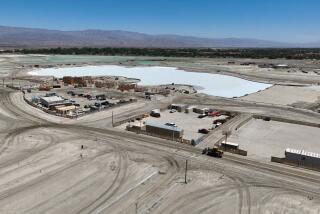Disney ‘dream’ isn’t for everyone
The job description is simple: Make the customers believe that Disneyland is “a magic kingdom where life is a fairy tale and dreams really do come true.”
But at the end of the workday, many of the people who work at the “Happiest Place on Earth” sleep on air mattresses, in by-the-week motel rooms and in apartments shared with other families.
“I’ve been at this motel since 1997,” said Derrick, a Disney security guard who pays $209 a week in rent. He spoke to me Thursday night while standing in the doorway of the room he shares with two elderly aunts at Arena Inn and Suites in Anaheim, about a mile from his job.
Derrick said he would jump at a chance to live in a housing development proposed for a site across the street from his motel. As proposed, 15% of the 1,500 condos and apartments would be for low-income tenants such as Derrick, who earns $12 an hour. But his employer is doing everything in its power to crush the project.
First, Disney challenged the right of a council member to cast a vote on the housing because she intends to open a wine bar in the area and might have a conflict of interest. With the council member abstaining, a 2-2 split killed the development. The developer appealed, and last week Disney rolled out the heavy artillery, suing the city over an environmental study that had cleared the way for the project.
“We feel we have no other choice but to pursue this legal action to protect this vital area,” said Ed Grier, president of the Disneyland Resort.
The big cheeses insist that having several thousand of their own employees -- or anyone else’s -- live in the Anaheim Resort Area would dim the prospects for generating more business, jobs and taxes. When Mayor Curt Pringle pitched a hybrid of hotel and residential units, some of them for low-income tenants, Disney screamed from the top of the Matterhorn. Allowing people to live so close to the kingdom would set a “dangerous precedent,” said a Disney spokesman. Yeah, Mickey could get mugged on his way to Downtown Disney.
Scott Darrell, who runs a nonprofit affordable-housing agency called the Kennedy Commission, can’t understand why Disney is so opposed to the project.
“There’s already housing there,” said Darrell. There’s a mobile home park where the 1,500 residential units would be, and just down Haster Street are several dozen apartments.
Disney argues those were built in an earlier era, but new development should be all about tourism. And besides, Disney is thinking of building a third park -- oh thank heavens, finally! -- and wouldn’t want any normal activity in the vicinity, like their own employees walking home from work. Maybe Disney should just lock them all on the premises at night and let them sleep in the Haunted Mansion or the Enchanted Tiki Room.
To be fair, I think Disney has some reasonable arguments, despite the odious attempts to make City Hall do its bidding. Maybe a 1,500-unit mini-city, with several thousand residents, should be a few miles down the road. But instead of trying to torpedo housing proposals, Disney could earn a few PR points by leading the way in making sure that working stiffs like the ones it employs have a few more options.
Disney Resorts gave $11 million to community causes in 2006 (companywide profits were $1.7 billion in the last quarter alone), but none of it was for housing-related services. Why not throw a few bucks in the direction of the Orange County agencies that are in the business of finding housing solutions, such as the Kennedy Commission?
Among the 100 largest cities in the country, Anaheim was dead last in income growth between 1990 and 2000, according to Eric Altman. He’s with the Orange County Communities Organized for Responsible Development and said the combination of low wages in the hospitality business and extremely high real estate prices help make for widespread poverty in Orange County.
I met Altman and Cesar Covarrubias, of the Kennedy Commission, at the site of the doomed 1,500-unit housing development. At noon Wednesday, four women from the Peacock Suites Hotel’s housekeeping department walked by on their way to lunch, and we asked about their living arrangements.
They said they make $7 an hour, and all but one of them shares an apartment with members of another family. In one case, seven people live in a two-bedroom that costs $1,585 a month, and in another, eight people share a two-bedroom at $1,125 a month.
I later spoke by phone to a hotel switchboard operator who said that for 20 years she commuted from Riverside to the Hilton Anaheim, sometimes spending four hours on the road.
“I can tell you, there’s nothing cheaper than the Inland Empire,” said Lori Condinus, who is on leave from the hotel to work for the union representing hospitality employees.
Her one-bedroom apartment is $750, but the commute has taken years off her life.
“I just find it odd that corporate America will say it’s fine that you come and work here and help us prosper, but doggone it, you can’t live here. And now they’ve gone so far as to sue the city to make sure that we don’t live here.”
On my way to Anaheim on Thursday night, I spoke by phone to a woman who works in security at Disneyland and lives with seven family members -- including a nephew who also works at Disney -- in two motel rooms.
When I got to town I met up with Eddie, a Disneyland Hotel bellman who lives with his wife and children, and his parents. Eddie took me to see two friends who work at the same hotel.
Pedro and his wife live in a $950 one-bedroom with two teen-agers. He makes about $11 an hour, and his wife makes minimum wage in a cookie factory. Sometimes, Pedro said, he goes without the medicine he needs for a thyroid condition.
A few blocks away, directly across the street from the housing development that’s been scuttled, Antonio lives with his wife and 19-year-old son in a $900 one-bedroom. After 15 years working banquets at the Disneyland Hotel, he makes $11.27 an hour and fears he’ll lose this apartment if and when Disney builds its third theme park.
“The rent is 70% of my salary,” said Antonio, whose wife and son also work. Antonio himself cleans a house in Costa Mesa on one of his two days off. “My wife wants a two-bedroom, but I can’t afford it. My son needs privacy. He needs his own room. But I can’t afford it.”
Eddie asked Antonio to show me his envelopes, and Antonio removed several small white envelopes from his wallet. One had his mother’s name on it. One had the name of the bank where he took out a loan to buy his son’s computer. One said “Rent.” One said “luz” for lights, or electricity. He puts money in each of them throughout the month as it comes in, so he won’t come up short.
“I know a house near here where 18 people live,” Antonio said. “When am I going to get a house? It’s a dream that will never happen.”
*
More to Read
Inside the business of entertainment
The Wide Shot brings you news, analysis and insights on everything from streaming wars to production — and what it all means for the future.
You may occasionally receive promotional content from the Los Angeles Times.











